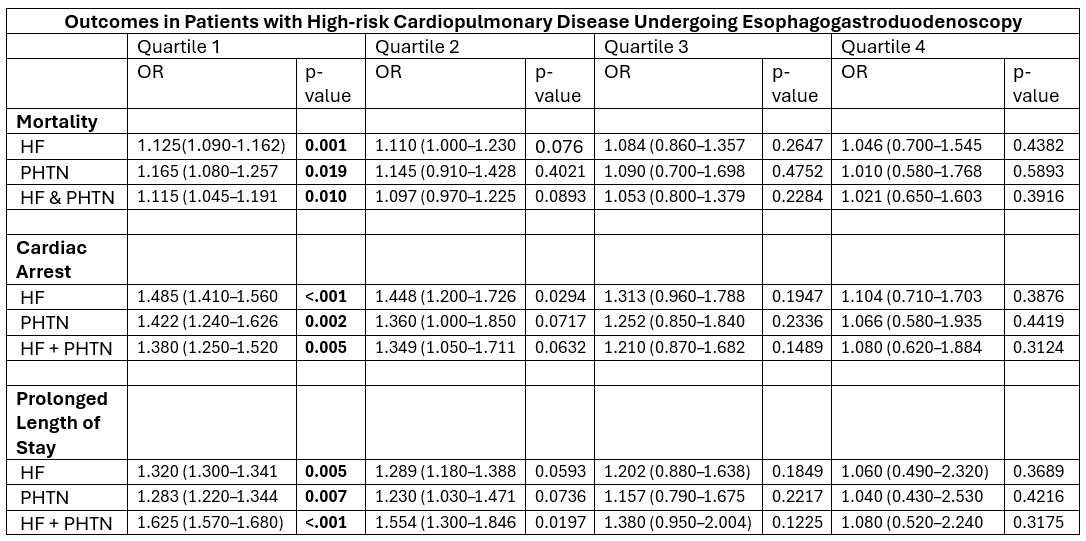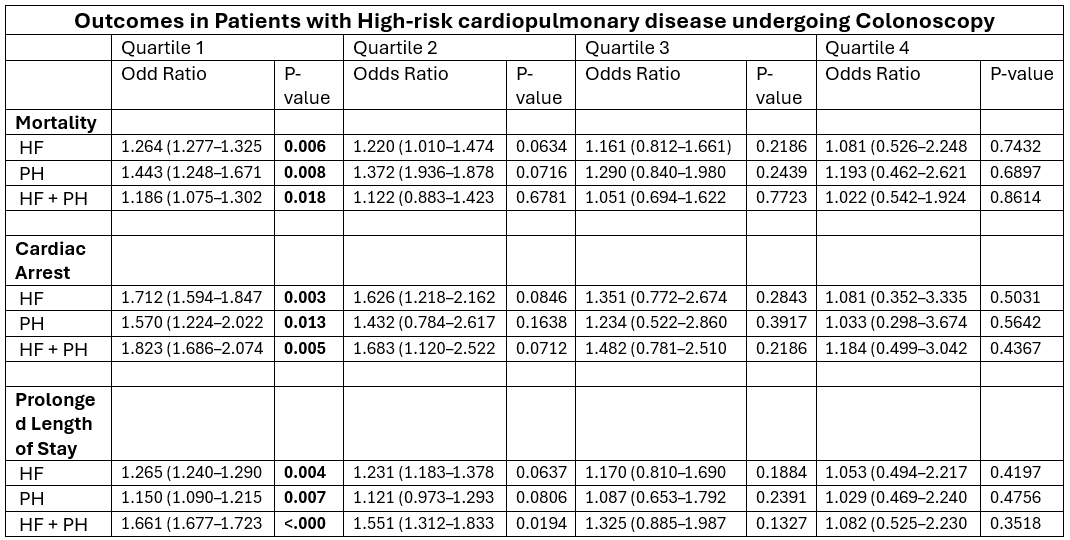Tuesday Poster Session
Category: General Endoscopy
P5133 - Patients With Heart Failure and Pulmonary Hypertension Have Worse Outcomes Following Esophagogastroduodenoscopy and Colonoscopy When Treated at Low-Volume Hospitals
Tuesday, October 28, 2025
10:30 AM - 4:00 PM PDT
Location: Exhibit Hall

Chukwunonso Ezeani, MBBS
Mayo Clinic
Phoenix, AZ
Presenting Author(s)
Chukwunonso Ezeani, MBBS1, Lekhya Kollu, BA2, Oyedotun Babajide, MD3, Bishoy Lawendy, MD4, Chukwuemeka Ogbu, MD, MPH5, Muni Rubens, Bsc6, Philip Okafor, MD, MPH, FACG7
1Mayo Clinic, Phoenix, AZ; 2Lewis Katz School of Medicine at Temple University, Philadelphia, PA; 3NYC Health + Hospitals/Metropolitan, New York, NY; 4University of Western Ontario, London, ON, Canada; 5Cape Fear valley Medical Center, Fayetteville, NC; 6Miami Cancer Institute, Miami, FL; 7Mayo Clinic, Jacksonville, FL
Introduction: Heart failure (HF) and pulmonary hypertension (PHTN) are high-risk cardiopulmonary conditions associated with worse patient outcomes. There is limited data for patients with HF and PHTN undergoing diagnostic EGD or colonoscopy. We performed a retrospective analysis of outcomes in patients with HF or PHTN undergoing EGDs or colonoscopies and explored the interaction with hospital volume.
Methods: Patients with HF and/or PHTN who underwent EGD or colonoscopy between 2016 and 2021 were extracted from the National Inpatient Sample (NIS). Hospitals were divided into quartiles (quartile 1 = lowest volume, quartile 4 = highest volume) based on the annual number of endoscopic procedures performed. Multivariable regression analyses were used to compare outcomes by hospital volume after controlling for potential confounders. The primary outcome was all-cause in-hospital mortality. Secondary outcomes included cardiac arrest and prolonged length of stay. Outcomes were reported as adjusted odds ratios (OR) and 95% confidence intervals (CI). A p-value of <0.05 was considered statistically significant.
Results: The analysis cohort consisted of 81,725 patients with HF and/or PHTN who underwent EGD or colonoscopy during the study period. There was a higher proportion of females (55% vs 45%, p <0.001). Among patients with HF and PHTN undergoing EGD, the adjusted odds of death were highest in the lowest-volume hospitals (quartile 1, OR=1.115 (1.05-1.19), p=0.01). The same trend was observed for cardiac arrest (quartile 1, OR 1.380 (1.25-1.52), p 0.005). No difference in mortality or cardiac arrest was observed in the higher-volume hospitals (quartiles 3 & 4, Table 1). Among patients undergoing colonoscopy, a similar trend of worse outcomes in quartile 1 hospitals was observed. Patients with PHTN and HF treated at the lowest-volume hospitals had increased odds of mortality (OR 1.19, CI 1.07-1.30, p=0.02), cardiac arrest (OR 1.82, CI 1.69-2.07, p=0.0046) and prolonged LOS (OR 1.66, CI 1.67-1.72, p<0.0001) [Table 2]. Similar outcomes for patients with either HF or PHTN are highlighted in Tables 1 and 2.
Discussion: Patients with HF and/or PHTN undergoing EGD or colonoscopy in low volume hospitals have worse outcomes compared to similar risk patients treated at higher volume hospitals. These results suggest a volume-outcome relationship, which may be related to the availability of specialist care, including cardiac anesthesia, leading to expertise and competence in caring for these high-risk patients.

Figure: Table 1: Outcomes in Patients with High-risk Cardiopulmonary Disease Undergoing Esophagogastroduodenoscopy

Figure: Table 2: Outcomes in Patients with High-risk cardiopulmonary disease undergoing Colonoscopy
Disclosures:
Chukwunonso Ezeani indicated no relevant financial relationships.
Lekhya Kollu indicated no relevant financial relationships.
Oyedotun Babajide indicated no relevant financial relationships.
Bishoy Lawendy indicated no relevant financial relationships.
Chukwuemeka Ogbu indicated no relevant financial relationships.
Muni Rubens indicated no relevant financial relationships.
Philip Okafor indicated no relevant financial relationships.
Chukwunonso Ezeani, MBBS1, Lekhya Kollu, BA2, Oyedotun Babajide, MD3, Bishoy Lawendy, MD4, Chukwuemeka Ogbu, MD, MPH5, Muni Rubens, Bsc6, Philip Okafor, MD, MPH, FACG7. P5133 - Patients With Heart Failure and Pulmonary Hypertension Have Worse Outcomes Following Esophagogastroduodenoscopy and Colonoscopy When Treated at Low-Volume Hospitals, ACG 2025 Annual Scientific Meeting Abstracts. Phoenix, AZ: American College of Gastroenterology.
1Mayo Clinic, Phoenix, AZ; 2Lewis Katz School of Medicine at Temple University, Philadelphia, PA; 3NYC Health + Hospitals/Metropolitan, New York, NY; 4University of Western Ontario, London, ON, Canada; 5Cape Fear valley Medical Center, Fayetteville, NC; 6Miami Cancer Institute, Miami, FL; 7Mayo Clinic, Jacksonville, FL
Introduction: Heart failure (HF) and pulmonary hypertension (PHTN) are high-risk cardiopulmonary conditions associated with worse patient outcomes. There is limited data for patients with HF and PHTN undergoing diagnostic EGD or colonoscopy. We performed a retrospective analysis of outcomes in patients with HF or PHTN undergoing EGDs or colonoscopies and explored the interaction with hospital volume.
Methods: Patients with HF and/or PHTN who underwent EGD or colonoscopy between 2016 and 2021 were extracted from the National Inpatient Sample (NIS). Hospitals were divided into quartiles (quartile 1 = lowest volume, quartile 4 = highest volume) based on the annual number of endoscopic procedures performed. Multivariable regression analyses were used to compare outcomes by hospital volume after controlling for potential confounders. The primary outcome was all-cause in-hospital mortality. Secondary outcomes included cardiac arrest and prolonged length of stay. Outcomes were reported as adjusted odds ratios (OR) and 95% confidence intervals (CI). A p-value of <0.05 was considered statistically significant.
Results: The analysis cohort consisted of 81,725 patients with HF and/or PHTN who underwent EGD or colonoscopy during the study period. There was a higher proportion of females (55% vs 45%, p <0.001). Among patients with HF and PHTN undergoing EGD, the adjusted odds of death were highest in the lowest-volume hospitals (quartile 1, OR=1.115 (1.05-1.19), p=0.01). The same trend was observed for cardiac arrest (quartile 1, OR 1.380 (1.25-1.52), p 0.005). No difference in mortality or cardiac arrest was observed in the higher-volume hospitals (quartiles 3 & 4, Table 1). Among patients undergoing colonoscopy, a similar trend of worse outcomes in quartile 1 hospitals was observed. Patients with PHTN and HF treated at the lowest-volume hospitals had increased odds of mortality (OR 1.19, CI 1.07-1.30, p=0.02), cardiac arrest (OR 1.82, CI 1.69-2.07, p=0.0046) and prolonged LOS (OR 1.66, CI 1.67-1.72, p<0.0001) [Table 2]. Similar outcomes for patients with either HF or PHTN are highlighted in Tables 1 and 2.
Discussion: Patients with HF and/or PHTN undergoing EGD or colonoscopy in low volume hospitals have worse outcomes compared to similar risk patients treated at higher volume hospitals. These results suggest a volume-outcome relationship, which may be related to the availability of specialist care, including cardiac anesthesia, leading to expertise and competence in caring for these high-risk patients.

Figure: Table 1: Outcomes in Patients with High-risk Cardiopulmonary Disease Undergoing Esophagogastroduodenoscopy

Figure: Table 2: Outcomes in Patients with High-risk cardiopulmonary disease undergoing Colonoscopy
Disclosures:
Chukwunonso Ezeani indicated no relevant financial relationships.
Lekhya Kollu indicated no relevant financial relationships.
Oyedotun Babajide indicated no relevant financial relationships.
Bishoy Lawendy indicated no relevant financial relationships.
Chukwuemeka Ogbu indicated no relevant financial relationships.
Muni Rubens indicated no relevant financial relationships.
Philip Okafor indicated no relevant financial relationships.
Chukwunonso Ezeani, MBBS1, Lekhya Kollu, BA2, Oyedotun Babajide, MD3, Bishoy Lawendy, MD4, Chukwuemeka Ogbu, MD, MPH5, Muni Rubens, Bsc6, Philip Okafor, MD, MPH, FACG7. P5133 - Patients With Heart Failure and Pulmonary Hypertension Have Worse Outcomes Following Esophagogastroduodenoscopy and Colonoscopy When Treated at Low-Volume Hospitals, ACG 2025 Annual Scientific Meeting Abstracts. Phoenix, AZ: American College of Gastroenterology.
